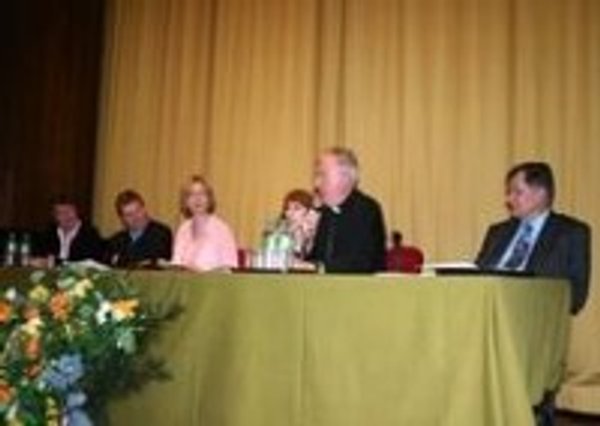Over 150 doctors, healthcare workers and medical and 6th form students have put the ethics of modern healthcare under the spotlight at ‘Celebrating Life’, a special one-day forum held by the Diocese of Westminster on Saturday 2nd December 2006.
In his opening remarks at ‘Celebrating Life’, which was held at Netherhall House, London, Cardinal Cormac Murphy-O’Connor proclaimed medicine as a ‘wonderful vocation’ but stated: “Medical procedures, while capable of reducing pain in its many varied forms, are incapable of answering the question about whether it is right or good for them to be done. This certainly applies to embryonic stem cell work, foetal experimentation, use of cell lines from aborted foetuses, many of the reproductive technologies, sterilisation processes, terminal sedation (a term for murder of the elderly or incompetent), and who knows what they will conceive of next.”
Cardinal Cormac Murphy O’Connor highlighted the fact that good Catholic medical ethics “does not mean rejecting any and all medical or scientific advancements but it does mean being very careful about the attitude that “if we can, we must, even if we morally shouldn’t” as opposed to the faith-based response: “if we shouldn’t, then we mustn’t, even if we can.”
Dr. Philip Howard
In the key-note presentation, Dr. Philip Howard, Senior Lecturer at St. George’s Hospital Medical School and Consultant at St.Helier/Epsom NHS Trust presented an analysis of the ethical and Christian philosophical principles underpinning the teaching of Pope John Paul II’s Encyclical “Evangelium Vitae.” “Human dignity is the key to understanding our common goal in medical ethics. To be human” argued Dr. Howard, “is to be endowed with inalienable rights, not least the right to exist.”
Against this background Dr. Howard highlighted the problem of secular ethics which embraced the principle of autonomy over and above fundamental rights, meaning that areas like modern reproductive technology did not pay “homage to all being equal under the Creator and with the right to the fundamental right to life.”
‘Question Time’
The forum also included a ‘Question Time’ session’ , chaired by journalist Sarah Johnson, which tackled a wide-range of issues including ‘Will doctors retain the right to conscientious objection to various methods of treatment on ground of their religious belief in the face of changing laws?’ ‘What is the difference between contraception and natural family planning?’ and ‘How does one explain to colleagues that a single cell conceptus (fertilized embryo) is a human being when the majority of practitioners are materialists ?’
The panel answering the questions included: Dr. Anne Carus – a leading physician with LIFE and expert in NaProtechnology a system with a 50% success rate of effectively assisting couples to overcome sub-fertility in an ethical way; Dr. Charlie O’Donnell, Consultant in Intensive Care medicine and Dr. Helen Watt, Director of the Linacre centre for healthcare ethics.
In the closing remarks of the forum, Edmund Adamus, Director for Pastoral Affairs for the Diocese of Westminster, said that ‘Celebrating Life’ had succeeded in highlighting the need to encourage wider appreciation of many fields of medicine but particularly the issues around the moral/physical risks relating to contraception, womens’ gynaecological health and to activate better pastoral support for all methods of natural fertility management. “In the words of John Paul II in the Encyclical” he said, we must “walk as children of light”.
For the original report, see the Westminster Diocesan website at www.rcdow.org.uk
